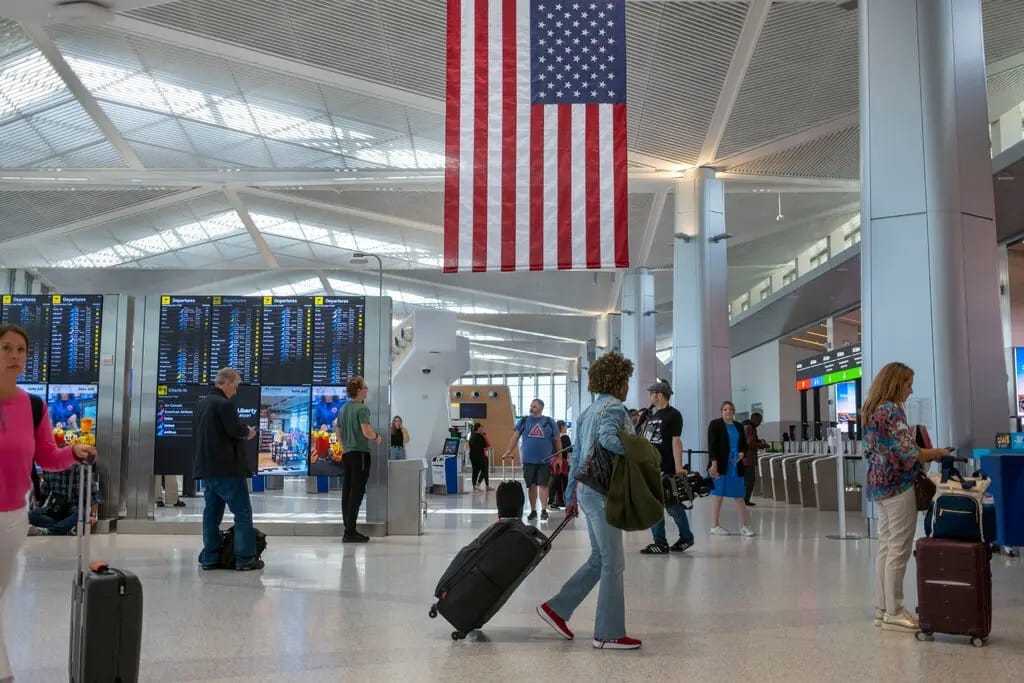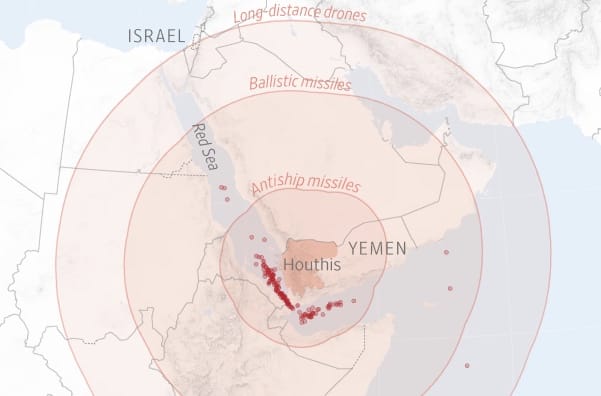June 5 2025
Trump revives travel ban; Trump suspends Harvard visas; Trump probes Biden's fitness; Newborn genetic testing debate; Houthi Rebels vs. Navy;

Trump Revives Travel Ban, Barring Citizens from 12 Nations
Trump Suspends Harvard From Student Visa Program, Barring Foreign Nationals
Trump Orders Unprecedented Probe Into Biden's Cognitive Fitness, Use of Autopen
The Genetic Crystal Ball: Experts Divided on Testing Newborns for Incurable, Adult-Onset Diseases
How Houthi Rebels Went Toe-to-Toe With the World's Most Powerful Navy
Newsletter sponsor

1. Trump Revives Travel Ban, Barring Citizens from 12 Nations
Citizens of 12 countries, primarily in Africa and the Middle East, grappled on Thursday with the news that President Trump had barred them from traveling to the United States, reviving a travel ban from his first term that led to chaos and legal challenges. When the president’s order takes effect on Monday, citizens of Afghanistan, Myanmar, Chad, the Republic of Congo, Equatorial Guinea, Eritrea, Haiti, Iran, Libya, Somalia, Sudan and Yemen will not be allowed to enter the United States. The ban announced by Mr. Trump on Wednesday was his latest crackdown on immigration. In recent months he has ordered raids across the country to detain immigrants, blocked asylum seekers at the southern border and barred international students from Harvard University, among other steps. Last year the State Department issued about 170,000 total visas to citizens of the 12 countries subject to the ban. The new order touches more parts of the world and could affect more people than the travel ban announced during Mr. Trump’s first term, in 2017, which targeted seven Muslim-majority countries. Two of those countries, Syria and Iraq, were not named in this order.
NYT
2. Trump Suspends Harvard From Student Visa Program, Barring Foreign Nationals
WASHINGTON—President Trump suspended Harvard from participating in the student visa program, effectively prohibiting foreign nationals from attending the nation’s most prominent university. The proclamation issued by the White House late Wednesday ramps up Trump’s attacks on the university, which has fought back against the administration in federal court. The proclamation seeks to prevent students from receiving visas to study for six months and perhaps longer. The escalation comes as Harvard has declined to negotiate with Trump after the school rejected a series of demands from the administration’s Task Force to Combat Antisemitism. Those demands included oversight of faculty hiring, viewpoints and student admission at Harvard. Trump has pulled billions of dollars in federal research funds, threatened Harvard’s tax-exempt status and probed its acceptance of foreign donations. Around a quarter of Harvard’s student population comes from abroad, with the proportion even higher in certain graduate schools, and the university relies on its tuition payments, which are often full-fee. Trump’s proclamation suspends foreign nationals from entering the U.S. to study through the student-visa program, effective Wednesday. It says the secretary of state will decide whether foreign nationals who are currently at Harvard should also have their visas revoked. The Trump administration last month attempted to bar foreign student enrollment at Harvard by revoking the school’s certification in the government’s Student and Exchange Visitor Program, which allows noncitizens to study in the U.S. under student visas. A federal judge blocked the government’s move for now while the two sides fight it out in court.
Editor's Note: Regardless of how one views Trump's conflict with Harvard, the university's decision to fight rather than negotiate was strategically unwise. While courts might uphold a ban imposed by presidential proclamation, this situation is different—it involves the State Department simply refusing to grant student visas. Though I may be mistaken, it appears the only path to reversing this policy would be a Democratic victory in 2028, unless Trump decides to negotiate a deal beforehand.
WSJ
3. Trump Orders Unprecedented Probe Into Biden's Cognitive Fitness, Use of Autopen
President Donald Trump on Wednesday ordered a broad investigation into whether Joe Biden covered up a cognitive decline while in the White House and was incapable of executing presidential decisions — an unprecedented request that in theory could undermine thousands of Biden’s executive actions and pardons. The order focused in part on whether Biden’s use of the autopen — a machine that uses real ink to duplicate a human signature — on executive actions was legitimate, or whether his aides used it to hide a president who was not cognitively capable of signing them himself. Presidents have long used autopens to sign executive orders, and Trump has said that he also has used it for routine correspondence. “Let me be clear: I made the decisions during my presidency,” Biden said in a statement late Wednesday. “I made the decisions about the pardons, executive orders, legislation, and proclamations. Any suggestion that I didn’t is ridiculous and false.”
Washington Post
4. The Genetic Crystal Ball: Experts Divided on Testing Newborns for Incurable, Adult-Onset Diseases
In every postpartum hospital unit across the country, 1-day-old babies undergo the same ritual: A nurse pricks the newborn’s heel and stamps tiny drops of blood onto a paper filter, which is then sent off for a standard screening panel. Today, that panel checks for unusual bio-markers that may indicate a rare but treatable disease like sickle cell anemia or cystic fibrosis. But what if that same dried blood spot could tell you about the baby’s risk of developing certain conditions later in life — some with no method of prevention or cure? What if that heel prick could tell you that the baby was almost certainly going to be diagnosed with autism by the time they turned 5? Or that the child would be more likely to develop breast cancer as an adult? Would you want to know? Would she? These questions are no longer hypothetical. Tens of thousands of parents have sought such insights by enrolling their newborns in research projects that examine the baby’s genome — the full blueprint for her growing body. As the cost of sequencing plummets, the practice of analyzing hundreds of genes in healthy babies is quietly on the rise, ushering in new questions about where to draw the boundaries of knowledge — and who should get to decide. Scientifically speaking, the possibilities are almost endless. Since virtually every disease has some basis in our genes, the full genome — with three billion base pairs, coding some 20,000 genes — contains a wealth of data to be mined for lifesaving intel and gut-wrenching secrets. But the experts are divided. Some say that revealing a risk of an incurable illness will only put parents in distress, bombarding them with despairing predictions for their young child’s life. Others believe any data about diseases that arise in adulthood, like breast or colon cancer, must be excluded, since they violate that future adult’s privacy and autonomy — in other words, the right not to know. Still others are of the mind-set that genetic forecasting is the future of medicine, and that knowledge is power — if used wisely.
NYT
5. How Houthi Rebels Went Toe-to-Toe With the World's Most Powerful Navy

The evening of May 6, an F/A-18 Super Hornet was coming in for a landing on the USS Harry S. Truman aircraft carrier in the Red Sea. An onboard mechanism to slow down the fighter jet failed, and the $67 million aircraft slid off the carrier’s runway and into the water. It was the third fighter jet that the Truman had lost in less than five months, and came hours after President Trump surprised Pentagon officials with the announcement that the U.S. had reached a truce with the Houthis in Yemen. The Truman had arrived at the Red Sea in December 2024 to battle the Iran-aligned militants—joining a campaign filled with heavy exchanges and close calls that strained the U.S. Navy. Officials are now dissecting how a scrappy adversary was able to test the world’s most capable surface fleet. The Houthis proved to be a surprisingly difficult foe, engaging the Navy in its fiercest battles since World War II despite fighting from primitive quarters and caves in one of the world’s poorest countries. The Houthis benefited from the proliferation of cheap missile and drone technology from Iran. They fired antiship ballistic missiles, the first-ever combat use of the Cold War-era weapon, and they innovated how they deployed their weaponry. The latest technologies have transformed maritime warfare, much the way they have rewritten the script for land wars in Ukraine—forcing militaries to adapt in real time. The U.S. is developing fresh ways to intercept the newest drones and missiles but still relies largely on expensive defense systems. Some 30 vessels participated in combat operations in the Red Sea from late 2023 through this year, around 10% of the Navy’s total commissioned fleet. In that time, the U.S. rained down at least $1.5 billion worth of munitions on the Houthis, a U.S. official said. The Navy was able to destroy much of the Houthis’ arsenal—but it has yet to achieve the strategic goal of restoring shipping through the Red Sea, and the Houthis continue to regularly fire missiles at Israel. The effects of the deployment will be felt for years. It drew resources from efforts in Asia to deter China and pushed back maintenance schedules for carriers. That could create critical gaps in the second half of the decade, when the giant warships will have no choice but to dock for service. Despite the wear and tear, Navy officials said the fight with the Houthis offered invaluable combat experience, and the Red Sea conflict is viewed inside the Pentagon as a warm-up for a potential “high-end” conflict with China.

WSJ
June 5, 1968: Robert F. Kennedy assassinated

Sign up for local news delivered to your inbox in:
Many more cities coming soon!
See the citizen journal Podcast! Released on Apple and Spotify around 10a CST.
Sponsors (click me!)





SUBSCRIBE TO GET THE CITIZEN JOURNAL IN YOUR INBOX - FREE!
subscribe/unsubscribe to city emails, subscribe to app notifications, get the app
Sources
- https://www.nytimes.com/live/2025/06/05/us/trump-news-travel-ban/heres-the-latest?smid=url-share
- https://www.wsj.com/us-news/education/trump-issues-proclamation-suspending-foreign-students-at-harvard-e62859c4?mod=hp_lead_pos2
- https://www.washingtonpost.com/politics/2025/06/04/trump-biden-investigate-cover-up-decline-autopen/
- https://www.nytimes.com/2025/06/05/health/should-we-test-babies-for-incurable-diseases.html
- https://www.wsj.com/world/middle-east/navy-houthis-maritime-war-5517a127?mod=hp_lead_pos7
